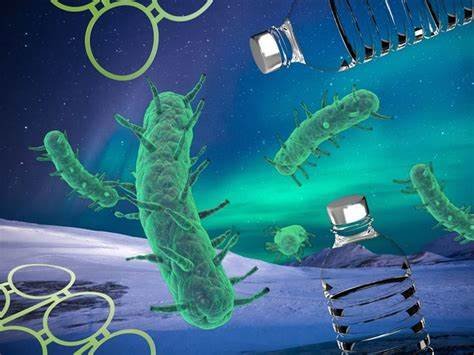In a significant breakthrough, scientists have discovered microbes in the Arctic and Alps that possess the ability to digest certain biodegradable plastics at much lower temperatures than previously believed. This discovery opens up new possibilities for combating plastic pollution in a more environmentally friendly manner. The research, led by Joel Rüthi, an environmental microbiologist at the Swiss Federal Institute for Forest, Snow, and Landscape Research, involved sampling strains of bacteria and fungi growing on plastic in Switzerland, Greenland, and Svalbard.
Published in the journal Frontiers in Microbiology, the study revealed that while these strains could not digest non-biodegradable materials, specific microbes, including some previously unidentified ones, exhibited the capability to break down biodegradable plastics even at temperatures as low as 15 degrees Celsius (59 degrees Fahrenheit). Rüthi emphasizes that these findings could greatly contribute to future efforts towards establishing an environment-friendly circular plastic economy.
Traditionally, many microorganisms capable of breaking down certain polymers have been discovered, but they typically require temperatures above 30 degrees Celsius (86 degrees Fahrenheit) to function effectively. This explains why households are instructed to dispose of biodegradable plastic wrappers in garden or food waste bins, which are then subjected to heating in bioreactors. However, this heating process is costly and environmentally burdensome.
Rüthi and his team sought out these unique organisms in “overlooked cold environments” such as the heights of the Swiss Alps, where very few life forms can survive. In these extreme conditions, the microbes adapt and consume whatever sustenance is available, including plastic.
The industrial application of these newly discovered microbes could potentially revolutionize plastic recycling, offering a more affordable and sustainable approach to creating a true circular economy. Tom Whipple, science editor at The Times, describes the findings as a promising avenue for recycling plastic in a cost-effective manner.
Microbes are increasingly recognized as powerful tools in the fight against microplastic pollution, which has become ubiquitous, even found in our bloodstreams. As plastic pollution continues to escalate, the development of sustainable methods for disposing of this persistent waste is crucial.
The discovery of these cold-weather plastic-digesting microbes in the Arctic and Alps provides hope for a more effective and efficient solution to the plastic pollution crisis. By harnessing the natural capabilities of these organisms, we may be one step closer to mitigating the harmful environmental impacts of plastic waste and transitioning to a more sustainable future.

